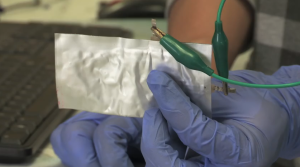
A research team from Standford University has developed a high-performance aluminum battery.
Image: YouTube/Stanford University
Researchers have been attempting to make a commercially viable aluminum-ion battery for years. Now, a team from Stanford University may have developed just the thing to outpace widely used lithium-ion and alkaline batteries.
The new aluminum-ion battery demonstrates high performance, a fast charging time, long-lasting cycles, and is of low cost to produce.
“We have developed a rechargeable aluminum battery that may replace existing storage devices, such as alkaline batteries, which are bad for the environment, and lithium-ion batteries, which occasionally burst into flames,” said Hongjie Dai, a professor of chemistry at Stanford.
The researchers were able to achieve this novel battery by applying graphite as the cathode material.
This from Stanford University:
For the experimental battery, the Stanford team placed the aluminum anode and graphite cathode, along with an ionic liquid electrolyte, inside a flexible polymer-coated pouch.
The new cathode material allows for an aluminum-ion battery with a faster charge time and higher durability. The new battery can withstand more than 7,500 cycles without any loss of capacity.
Compare this the typical 100 charge-discharge cycle of the previous generation of aluminum-ion batteries and the 1,000 cycle durability of the current lithium-ion battery.
Along with applications in small electronics, the new aluminum-ion battery has the potential to be used in the storage of renewable energy on the electric grid.
Get involved in the energy conversation by joining us at the 227th ECS Meeting, where our Plenary Session will feature John A. Turner of the National Renewable Energy Laboratory.


